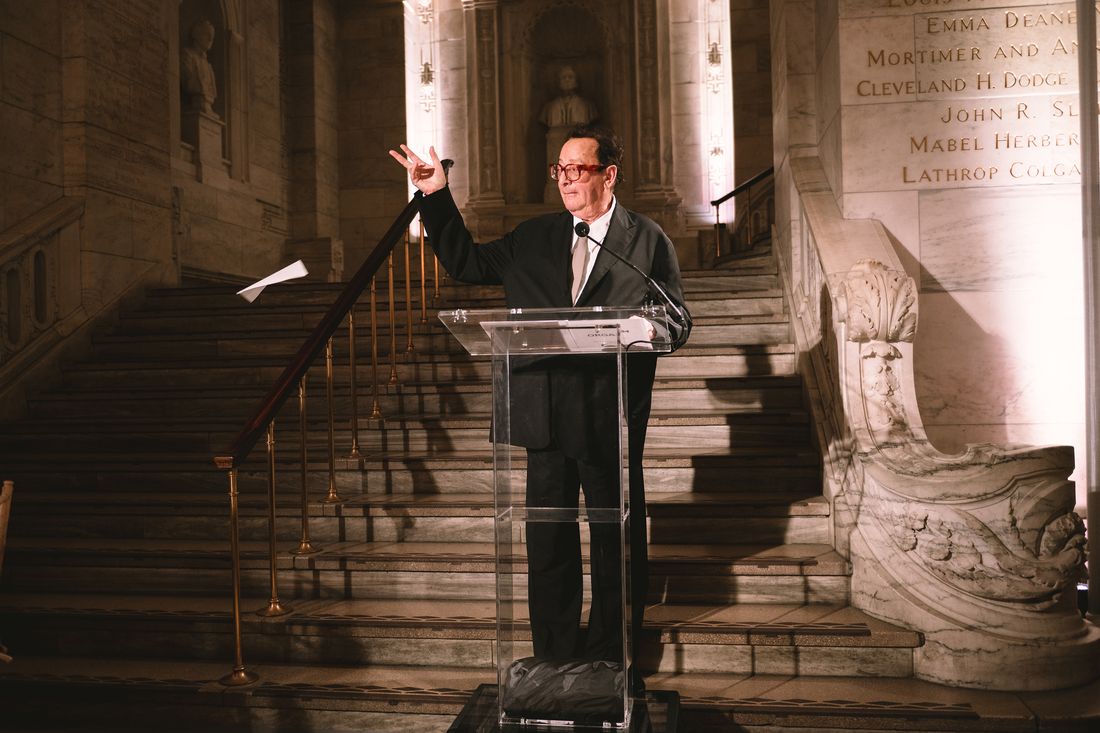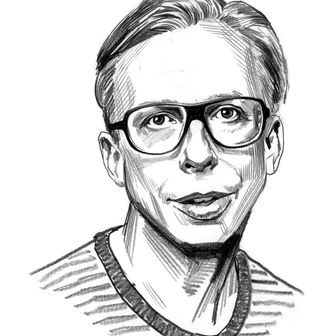
Famous ad guy Lord Maurice Saatchi co-founded Saatchi & Saatchi, which for a while was one of the largest agencies in the world. So he really knows how to pitch. When I find him at a back table at Il Gattopardo, a quiet-luxury Italian restaurant in the bottom of a townhouse across from the Museum of Modern Art, on a recent Saturday, the elegantly soft-spoken 77-year-old is wearing his trademark Mr. Magoo glasses and a long white shirt that extends down below his knees. ItÔÇÖs noon, and he has already ordered a glass of white wine and is prepared to tell me about ÔÇö or sell me on ÔÇö his saucily titled book, Orgasm, a large-format, large-print collection of his essays. Each is designed to rhetorically demolish what he apparently perceives as the readerÔÇÖs preconceived notions. Chapter titles include ÔÇ£Conservatives Are Cruel,ÔÇØ ÔÇ£Poetry Is for Wimps,ÔÇØ ÔÇ£Cocktail Parties Are Stressful,ÔÇØ ÔÇ£America Is Perfect,ÔÇØ and ÔÇ£Truth Is Good.ÔÇØ He hopes to disabuse you of these beliefs, assuming that you hold them.
He has priced Orgasm at $100. Assuming that I havenÔÇÖt bothered to read it, he starts off with the big catchy idea. ÔÇ£We know that a physical orgasm is the most blissful human experience,ÔÇØ he says, the theme music from Succession actually playing in the background. ÔÇ£This book claims that there is another kind of orgasm ÔÇö an orgasm of the mind. Which has nothing to do with sex. Which is even more pleasurable.ÔÇØ The waiter arrives with an amuse-bouche, with compliments from the chef: arancini, a rice ball with sweet peas, mozzarella, and pear.
This Saatchi is not as famous as Charles, his art-collecting older brother who helped invent the YBA and was once married to Nigella Lawson. They were born in Iraq, the children of a prosperous textile dealer, and immigrated to England in 1947 to flee antisemitism. At Saatchi & Saatchi, which the brothers founded in 1970, Maurice was the affable, business-minded Roger Sterling to his brotherÔÇÖs volatile Don Draper. He has matured into an Establishment figure in the U.K., where he was a close friend and adviser to Margaret Thatcher and, for a time, co-chairman of the Conservative Party. The brothers were booted from Saatchi & Saatchi in the mid-ÔÇÖ90s over accusations of mismanagement, two years before Maurice was given his lifetime peerage. He went on to found another successful agency, M&C Saatchi, which he left in 2019 in a dispute over how to handle accounting problems.
This isnÔÇÖt SaatchiÔÇÖs first book. While at Saatchi & Saatchi, he wrote Brutal Simplicity of Thought: How It Changed the World, more or less an advert for his advertising agency. He is also an inveterate pamphleteer with works including The Science of Politics, about how taxes should be lower, and Happiness CanÔÇÖt Buy Money. In 2022, he published a memoirish book called Do Not Resuscitate: The Life and Afterlife of Maurice Saatchi, in which he imagines himself standing at the Gates of Heaven, trying to make a pitch to join his wife, Josephine Hart, who had died of cancer 11 years before and whom he clearly loved very much. The main question in the book that he had to account for was, ÔÇ£Did you or did you not try to change the world for the better?ÔÇØ The Times Literary Supplement called it ÔÇ£a trauma memoir that reads like a movie script, a mad play.ÔÇØ
After he sends back our appetizers ÔÇö ÔÇ£This wasnÔÇÖt what we were expecting. I think we made a mistake. IÔÇÖm really sorry, but we were expecting something completely differentÔÇØ ÔÇö Saatchi attempts to describe how this book came together. Many of these essays had found their origins in musings that heÔÇÖd previously published for the Daily Telegraph and the Daily Mail or given in speeches before the House of Lords. ItÔÇÖs a sort of best-of of what seem to be SaatchiÔÇÖs most cherished brain-teasing topics. ÔÇ£I tried to assemble over a period of time what I describe here as popular lies,ÔÇØ he says in his plummy drawl. ÔÇ£Then I present my version of the truth. The idea is that the reader will then be able to make up its mind whether something is true. WhatÔÇÖs true, whatÔÇÖs not true. Perhaps itÔÇÖs all lies. ThatÔÇÖs really the concept.ÔÇØ This, he hopes, would lead the reader to the titular orgasm of the mind where ÔÇ£the road ahead is straight and the destination is clear. The intense pleasure of knowing that the contradictions in your head have been resolved. To some extent.ÔÇØ At which point, presumably, you could smoke a cigarette or just roll over and go to sleep.
If this all seems a bit mental-masturbatory, Saatchi, at this time in his life, seems like a supremely indulged man. And frightfully well connected. ItÔÇÖs clear that, on some basic level, Saatchi has not lived in the day-to-day world, with quotidian concerns, for many years ÔÇö perhaps ever. Even his wallet is a folded-up envelope with the logo of the House of Lords on its back. Two nights before, President and Secretary Clinton, Letitia James ÔÇö heÔÇÖd never met her before and was impressed ÔÇö Darren Walker, Laurene Powell Jobs, Lynn de Rothschild, and Don Lemon, among others of similarly high-value social status, had showed up at the New York Public Library to toast and take home a free copy of the black clothbound volume imprinted with a silver O on the cover. He was pleased with the bookÔÇÖs elite reception: There was also a party in Los Angeles, hosted by Sherry Lansing ÔÇö Mike Ovitz, Kathy and Rick Hilton, and Peter Guber were there ÔÇö as well as another, smaller party at Holly PetersonÔÇÖs townhouse, here in New York, co-hosted by Tina Brown. Carl Bernstein and Diane Sawyer were present, too; Bernstein told him a story Saatchi quite liked about how when he was
reporting on Watergate, they knew they were only going to be able to tell ÔÇ£ÔÇÿthe closest available version of the truth.ÔÇÖ ThatÔÇÖs good. I liked that a lot.ÔÇØ
Saatchi, it seems to me, is more a just-asking-questions person than a truth-teller. Everything is a bit airy and obscure. HeÔÇÖs far too ensconced in the Establishment to say anything too revealing. He was against Brexit but didnÔÇÖt vote against it ÔÇö ÔÇ£Abstained,ÔÇØ he tells me. When I ask him what was the last straw that made his fellow Tories force Boris Johnson to resign, he went off the record. Pretty much the only name he drops is Margaret Thatcher, telling a story about how disappointed she was with how big the countryÔÇÖs banks had gotten. This is one of his sort-of mea culpas: He bemoans how the globalized economy, which as an advertising mogul he worked hard to nurture, had evolved into a system of cartels. He gets into this in his book ÔÇö in the chapter that asks if ÔÇ£Big Companies Are Wonderful.ÔÇØ (The answer: ÔÇ£Rubbish.ÔÇØ) ÔÇ£This book claimsÔÇØ ÔÇö Saatchi has a habit of talking about its contents as if he himself had not written it ÔÇö ÔÇ£that the end result of globalization is not at all what believers in free markets thought. It could be, the ghastly thought, that Karl Marx was right, because his exact statement was, after years of warfare amongst capitalism, there will be fewer and fewer capitalists controlling vaster and vaster empires. If that isnÔÇÖt whatÔÇÖs happened, I donÔÇÖt know what is.ÔÇØ
As the entr├®es arrive, I ask him why the book costs so much. ÔÇ£IÔÇÖm testing a hypothesis for the publishing world,ÔÇØ he says, half-joking, half-relishing what he sees as his own daringly clever insight. ÔÇ£ItÔÇÖs obviously very expensive. But, for example, if a woman is prepared to pay $10,000 for an Herm├¿s bag, it must come into her mind, I assume, that if a bag is $10,000, it must be good. If you try and apply that to the book-publishing world, well, that will be a tremendous revolution. In the future, people will be very happy to pay $100.ÔÇØ If that doesnÔÇÖt pan out, he says, ÔÇ£it will be the biggest flop of all time.ÔÇØ
My guess is that if it does flop, unlike many things he has done in his well-publicized life, it will do so rather quietly.
More Art News
- ItÔÇÖs One Banana, Michael. What Could It Cost? $6.2 Million?
- The Extremely Chaotic Life of Jamian Juliano-Villani
- Maps of Things Past


